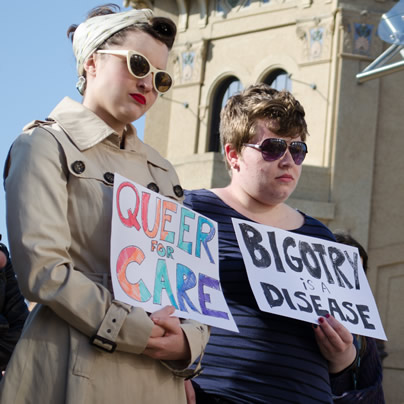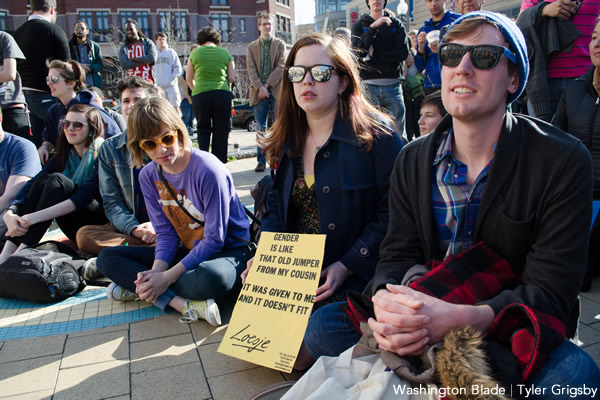Local
Transgender health care rally in D.C. draws more than 100
Whitman-Walker Health, Casa Ruby among groups that took part in the event

More than 100 people attended a rally in Columbia Heights on Saturday in support of equal access to health care for transgender people.
“We are here today to advocate for trans competent health care providers and for health care for the transgender community,” organizer Bryce Jordan Celotto said.
Nico Quintana, who came out as trans when he was 19, binded his chest for 10 years because his health insurance providers did not cover transition-related care.
He received a double mastectomy at an out-patient facility last year after saving more than $7,000, but developed an infection in his chest after the surgery. Quintana was hospitalized three times — and he said the personnel who admitted him to the hospital asked whether he was a man or a woman before they processed him.
“No one should have to think about that when they’re dying,” he said.
A 2011 study from the National Center for Transgender Equality and the National Gay and Lesbian Task Force noted 28 percent of respondents said they experienced harassment while in a doctor’s office or another health care setting. Forty-eight percent of respondents postponed medical care because they could not afford it.
Nearly a fifth of survey participants said a doctor or other health care provider refused to treat them because of their gender identity and expression. The study notes this figure is higher among trans people of color.
“It’s a sad state of affairs when the number one prerequisite for a good health care [provider] is that they’re nice,” Thomas Coughlin of Whitman-Walker Health said. He noted clients drive up to six hours to access trans-specific care at his agency. “One of our goals is to educate people about trans care and trans-sensitive health.”
Andy Bowen of the D.C. Trans Coalition and others who spoke at the rally applauded the D.C. government’s efforts to address health care and employment disparities among trans Washingtonians.
Then-Mayor Anthony Williams in 2005 signed a bill that added gender identity and expression to the D.C. Human Rights Law. The Metropolitan Police Department and the D.C. Department of Corrections have also released trans sensitivity guidelines.
More than 70 people have graduated from the Project Empowerment program the D.C. Department of Employment Services launched in 2011 as a way to help reduce unemployment and poverty rates among trans Washingtonians. The city’s insurance regulator last month also clarified existing regulations to say health insurance providers cannot discriminate against their trans policy holders.
Mayor Vincent Gray and other D.C. officials last September unveiled the country’s first publicly-funded campaign to combat anti-trans discrimination, but advocates stressed they need to do more to improve access to health care and reduce economic disparities among trans Washingtonians.
Tyra Hunter died from injuries she sustained during a 1995 car accident after emergency medical personnel who responded to the scene declined to treat her once they discovered she was trans. D.C. Fire Chief Kenneth Ellerbe last fall apologized to Hunter’s family on behalf of the department during a Transgender Day of Remembrance commemoration at the Metropolitan Community Church in Northwest Washington.
Bowen urged D.C. Medicare, Alliance and other publicly-funded health plans to cover trans-specific health care needs, such as hormones, and procedures.
The JaParker Deoni Jones Birth Certificate Equality Amendment Act of 2013, which is named for the trans woman whom Gary Niles Montgomery allegedly stabbed to death at a Northeast D.C. bus stop in Feb. 2012, would allow Washingtonians to legally change the gender on their birth certificates without sex-reassignment surgery.
The D.C. Council has scheduled a May 16 hearing on the proposal, but Casa Ruby CEO Ruby Corado said during the rally that the city needs to enforce existing laws designed to protect trans Washingtonians from discrimination.
“People have rights here,” she said. “We have human rights for everybody. There is equality.”
Maryland
Md. Commission on LGBTQIA+ Affairs released updated student recommendations
LGBTQ students report higher rates of bullying, suicide

The Maryland Commission on LGBTQIA+ Affairs has released updated recommendations on how the state’s schools can support LGBTQ students.
The updated 16-page document outlines eight “actionable recommendations” for Maryland schools, supplemented with data and links to additional resources. The recommendations are:
- Developing and passing a uniform statewide and comprehensive policy aimed at protecting “transgender, nonbinary, and gender expansive students” against discrimination. The recommendation lists minimum requirements for the policy to address: name, pronoun usage, and restroom access.
- Requiring all educators to receive training about the specific needs of LGBTQ students, by trained facilitators. The training’s “core competencies” include instruction on terminology, data, and support for students.
- Implementing LGBTQ-inclusive curricula and preventing book bans. The report highlights a “comprehensive sexual education curriculum” as specifically important in the overall education curriculum. It also states the curriculum will “provide all students with life-saving information about how to protect themselves and others in sexual and romantic situations.”
- Establishing Gender Sexuality Alliances “at all schools and in all grade levels.” This recommendation includes measures on how to adequately establish effective GSAs, such as campaign advertising, and official state resources that outline how to establish and maintain a GSA.
- Providing resources to students’ family members and supporters. This recommendation proposes partnering with local education agencies to provide “culturally responsive, LGBTQIA+ affirming family engagement initiatives.”
- Collecting statewide data on LGBTQ youth. The data on Maryland’s LGBTQ youth population is sparse and non-exhaustive, and this recommendation seeks to collect information to inform policy and programming across the state for LGBTQ youth.
- Hiring a full-time team at the Maryland Department of Education that focuses on LGBTQ student achievement. These employees would have specific duties that include “advising on local and state, and federal policy” as well as developing the LGBTQ curriculum, and organizing the data and family resources.
- Promoting and ensuring awareness of the 2024 guidelines to support LGBTQ students.
The commission has 21 members, with elections every year, and open volunteer positions. It was created in 2021 and amended in 2023 to add more members.
The Governor’s Office of Communication says the commission’s goal is “to serve LGBTQIA+ Marylanders by galvanizing community voices, researching and addressing challenges, and advocating for policies to advance equity and inclusion.”
The commission is tasked with coming up with yearly recommendations. This year’s aim “to ensure that every child can learn in a safe, inclusive, and supportive environment.”
The Human Rights Campaign’s most recent report on LGBTQ youth revealed that 46.1 percent of LGBTQ youth felt unsafe in some school settings. Those numbers are higher for transgender students, with 54.9 percent of them saying they feel unsafe in school.
Maryland’s High School Youth Risk Behavior Survey reveals a disparity in mental health issues and concerns among students who identify as LGBTQ, compared to those who are heterosexual. LGBTQ students report higher rates of bullying, feelings of hopelessness, and suicidal thoughts. Nearly 36 percent of LGBTQ students report they have a suicide plan, and 26.7 percent of respondents say they have attempted to die by suicide.
The commission’s recommendations seek to combat the mental health crisis among the state’s LGBTQ students. They are also a call for local and state governments to work towards implementing them.
Virginia
Va. lawmakers consider partial restoration of Ryan White funds
State Department of Health in 2025 cut $20 million from Part B program

The Virginia General Assembly is considering the partial restoration of HIV funding that the state’s Department of Health cut last year.
The Department of Health in 2025 cut $20 million — or 67 percent of total funding — from the Ryan White Part B program.
The funding cuts started with the Trump-Vance administration passing budget cuts to federal HIV screening and protection programs. Rebate issues between the Virginia Department of Health and the company that provides HIV medications began.
Advocates say the funding cuts have disproportionately impacted lower-income people.
The Ryan White HIV/AIDS Program, a federal program started in 1990, provides medical services, public education, and essential services. Part B offers 21 services, seven of which remained funded after the budget cuts.
Equality Virginia notes “in 2025, a 67 percent reduction severely destabilized HIV services across the commonwealth.”
Virginia lawmakers have approved two bills — House Bill 30 and Senate Bill 30 — that would partially restore the funding. The Ryan White cuts remain a concern among community members.
Both chambers of the General Assembly must review their proposed changes before lawmakers can adopt the bills.
“While these amendments aren’t a full restoration of what community-based organizations lost, this marks a critical step toward stabilizing care for thousands of Virginians living with HIV,” said Equality Virginia Executive Director Narissa Rahaman. “Equality Virginia plans to continue their contact with lawmakers and delegates through the conference and up until the passing of the budget.”
“We appreciate lawmakers from both sides of the aisle who recognized the urgency of this moment and will work to ensure funding remains in the final version signed by the governor,” added Rahaman.
District of Columbia
D.C. Black Pride theme, performers announced at ‘Speakeasy’
Durand Bernarr to headline 2026 programming

The Center for Black Equity held its 2026 DC Black Pride Theme Reveal event at Union Stage on Monday. The evening, a “Speakeasy Happy Hour,” was hosted by Anthony Oakes and featured performances by Lolita Leopard and Keith Angelo. The Center for Black Equity organizes DC Black Pride.
Kenya Hutton, Center for Black Equity president and CEO, spoke following the performances by Leopard and Angelo. Hutton announced this year’s theme for DC Black Pride: “New Black Renaissance.”
Performers for 2026 DC Black Pride were announced to be Bang Garcon, Be Steadwell, Jay Columbus, Bennu Byrd, Rue Pratt and Akeem Woods.
Singer-songwriter Durand Bernarr was announced as the headliner for the 2026 festivities. Bernerr gave brief remarks through a video played on the screen at the stage.
DC Black Pride is scheduled for May 22-25. For more information on DC Black Pride, visit dcblackpride.org.


















